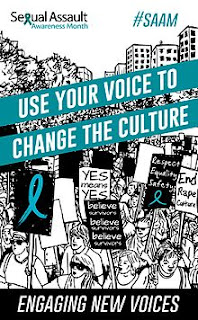Weaponizing Victims - Losing Progress Gained in MeToo
This isn’t a commentary on politics. This isn’t a commentary on due process. This isn’t a commentary on a pending supreme
court nominee – his character or qualifications. This isn’t a commentary on the predatory pig
that we have as a president. This isn’t
a commentary on the many other predatory pigs from both sides of the isle that
have risen to power and prominence during my lifetime. This isn’t a commentary on one woman. It is a desperate plea for all women.
This is a commentary on how we create a culture for female
victims of sexual assault to emerge from the shadows and tell their
stories. The culture we promote for
victims has far reaching consequences for every women for years – beyond the
somewhat fleeting confirmation of yet another man who may or may not have acted
inappropriately to women in his past. We were making progress this year. We have started to run in the wrong
direction.
This is a desperate plea to my intelligent friends from both
sides of the isle to realize that weaponizing victims is perhaps the most
powerful force to keep our women living in silence and fear. We have made some
progress toward stopping the shaming of victims. This last few weeks has seen weaponizing a
victim beyond her consent. It isn’t a
tool for progress. It may be an
effective tool for temporary political gain.
But I am worried about what it says for the future. I am concerned about what it does to girls
and women.
Until we improve our culture, sexual assaults will continue
unchecked. Until that culture is
created, powerful men will be enabled to continue to victimize women with
minimal consequence. Until that culture
is created, any intelligent woman knows that she has far more to lose from shining
a light than she does from hiding her pain in the dark.
The recent actions and activities related to the pending
Kavanaugh nomination has created significant internal turmoil for me. The problem is not whether a sexual assault
that occurred three decades ago. The
problem is the conversation – from both
sides of the isle. If you are a
Democrat, the convenient dialogue is that Kavanaugh needs to be intensely
examined about his conduct in high school and is not fit to be a supreme court
judge. If you are a Republican, the
convenient dialogue is that a smear campaign is occurring and we have
disregarded due process. If you are a
Democrat, we can talk about Trump’s tweets. If you are a Republican, you poke
holes in the victim’s story.
Why aren’t we talking as humans instead of political
vehicles? Why can’t we step back from a
political vortex and realize the culture we are creating is far more important
than any political elections or nomination? Why aren’t we talking about the catastrophic
chilling impacts to all women arising from what may prove to be, at best, a
fleeting political victory?
It has never been a secret to educated or professional women
that reporting a sexual assault by a powerful man has catastrophic
consequences. Five years ago, the logical
conclusion is that you would be put under a microscope, discredited and victim
shamed. You were either lying or seeking attention. Six
months ago, we had progressed to a point where society was having serious
conversations about sexual assaults and embracing the concept that we, as a
society, will not tolerate it and hold predators accountable. Before we developed consensus on the appropriate procedures and presumptions for such accountability, we threaten all progress. Today, we are showing our women that we are a
society that will latch onto a victim’s story and weaponize it beyond the
victim’s consent for our own political gain.
In my own life, I have learned that inappropriate conduct by
powerful men cannot be illuminated. The personal
cost is too great. I don’t want that to
be my story. The scrutiny will be worse
than the initial conduct. Once you
illuminate the conduct, you are a target – of venom, scrutiny and retribution. Many
of my peers have had similar experiences and reached similar conclusions. You no longer have control over the narrative
and it likely will not be compassionate. The only way to control your story is
to keep it to yourself.
Our court of public opinion does not yet have clear standards regarding the presumptions and procedures to apply to allegations of sexual conduct. It is a complicated and multifaceted debate. But we should each be able to unequivocally commit to applying uniform standards in our own conversations that are not influenced by our underlying political desires.
There always have been and always will be women who make
false accusations of rape or sexual assault (i.e. the Duke rape case). There always have been and always will be
women who seek attention and profit from their past sexual encounters (i.e.
Stormy Daniels). There will be future cases of mistaken identity. There are countless
women who have been victims of sexual assault by employers, politicians and
other powerful men.
Do we want to create a culture where legitimate victims always have to live in the shadows because we as a society will hijack their stories to promote our own agendas? We are silencing the women who have the most to lose – which makes them more attractive targets. In order to change our culture, we need to shine a compassionate light on their stories. Our culture will not change until we make them safe. And it is a dangerous balance of compassion and deliberations. For victims afraid we will shame them– we have now made them terrified we will weaponizing them.
Do we want to create a culture where legitimate victims always have to live in the shadows because we as a society will hijack their stories to promote our own agendas? We are silencing the women who have the most to lose – which makes them more attractive targets. In order to change our culture, we need to shine a compassionate light on their stories. Our culture will not change until we make them safe. And it is a dangerous balance of compassion and deliberations. For victims afraid we will shame them– we have now made them terrified we will weaponizing them.
Our recent dialogue has created two fatal blows to the MeToo
movement:
1.
To attention seekers: we reinforce that an
accusation is a sure-fire way for publicity.
2.
To respectable women: they will not be treated
with compassion and the cost of illuminating a truth isn’t worth the cost.
At the same time, we have both promoted false accusations
and silenced legitimate victims. Every
false accusation silences legitimate victims because it increases
scrutiny arising from an allegation. It colors perception and presumptions applied to allegations. Legitimate victims don’t need
any further discouragement from speaking. We cannot make these women weapons
for our own advantage.
I don’t know Dr. Ford.
But she is an intelligent and sophisticated woman. If she wanted to create a sensational media
story, she is sophisticated enough to have gone to a media outlet or a PR
machine. She did not. If she wanted to sell her story for money and
infamy, she would have elected to do so.
She did not. She confided her
story in a senator with a discrete request to investigate. Her story was
publicized without her consent and beyond her control. And it has been weaponized without regard for
the cost to Dr. Ford. Her life will
never be the same. If she knew now what
she feared three months ago, I suspect she would have remained silent. How many more women have we convinced to reach that conclusion before they gained enough courage to step into the light?
There is no true victory for any American here. If the accusations are true and confirmation
goes forward, he joins a deep bench of predatory males in powerful positions. (Unfortunate but hardly unprecedented). If the accusations are not true and the confirmation is blocked, we have destroyed
a man for political means. If the
accusations are true and the confirmation is blocked, we have achieved a fleeting
victory at an astronomical cost.
What is weaponizing a victim? It is using their story to advance an agenda - especially if you do not apply the same level of rigor to allegations leveled against persons in your own political party. Ask yourself whether you apply the same standards and same level of urgency when a similar allegation is made against someone of your own political party. A score card would not be productive but any honest person would acknowledge we have solid evidence of men on both sides of the isle engaging in predatory conduct. This isn't an issue unique to one political party - unchecked sexual assault is a problem embedded in many aspects of our society. We need to fight the problem - not the politics. We need to fight for women.
What is weaponizing a victim? It is using their story to advance an agenda - especially if you do not apply the same level of rigor to allegations leveled against persons in your own political party. Ask yourself whether you apply the same standards and same level of urgency when a similar allegation is made against someone of your own political party. A score card would not be productive but any honest person would acknowledge we have solid evidence of men on both sides of the isle engaging in predatory conduct. This isn't an issue unique to one political party - unchecked sexual assault is a problem embedded in many aspects of our society. We need to fight the problem - not the politics. We need to fight for women.
What is our politically charged activism telling our daughters
and women? And why aren’t we changing the conversation.



Comments
Post a Comment